A Disturbing Thought
Yesterday , John Bray, who writes under the pen name Jack Reusen, casually cast a glorious mind-pebble into the small group of poets and audience gathered to celebrate the written word at Blue Noun.
It was the Poetry Event at The Crieff Art Festival — local poets gave readings and shared the tales behind their writing.
This is my story of the evening, the event, and the moments that made it resonate.
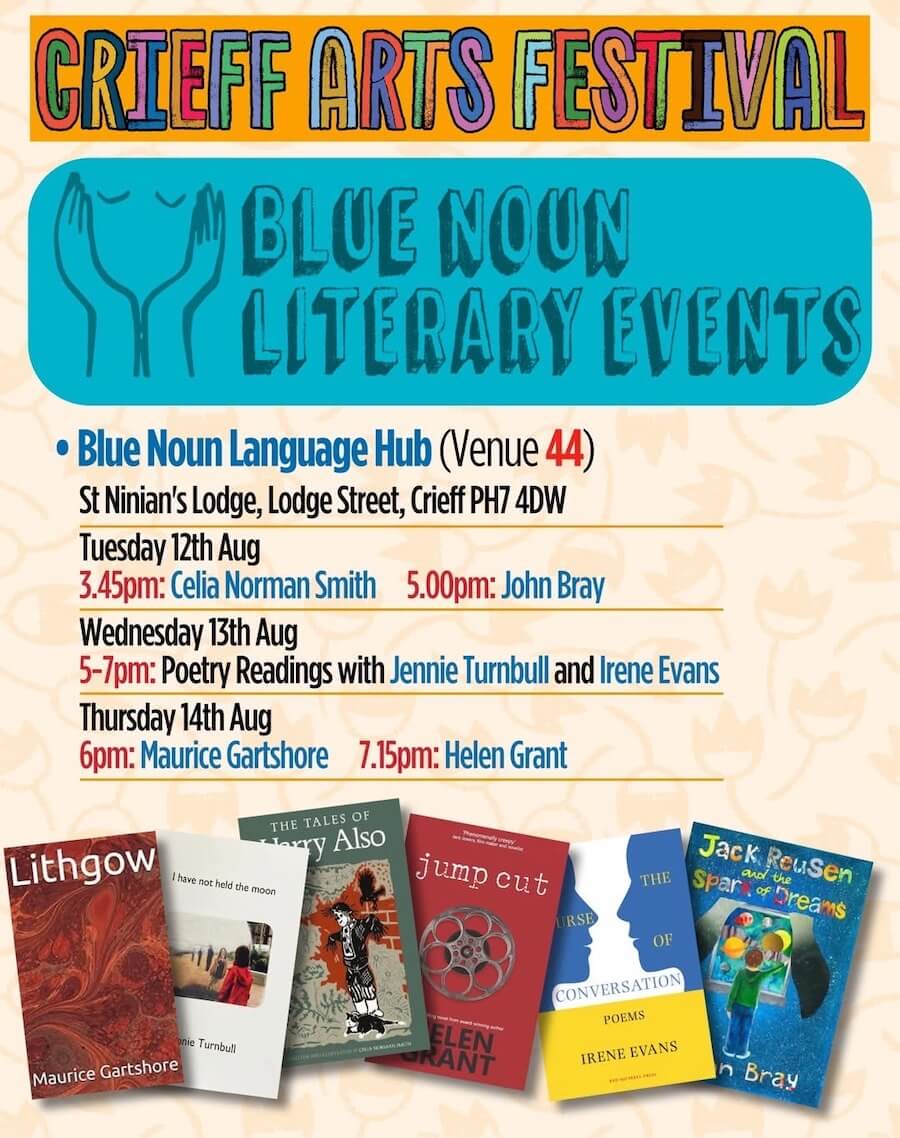
Crieff Art Festival at Blue Noun
The event was part of Crieff Arts Festival, largely organised by visual artist June McEwan.
Yesterday, two local poets read from their work.
Jennie Turnbull began the evening by explaining that she wrote about being ordinary. Married. A mum. She’d never skydived. Never walked barefoot in a desert.
It turns out she can do the thing I crave: capture the fleeting moments we share on this planet with our children, with her words.
I can’t say much more without falling into the clichés she so gracefully sweeps past, to share tiny moments that are hers — and everyone’s — in her wake.
Jennie’s work reminded me how a poet can offer a pause from the constant feeling rushing forward, and help you find truths in your heart that you may have carried, even enveloped (like a tree and a fence), without ever seeing.
A poet can place them in your hand.
I don’t often make time for poetry, but it occurs to me that slowing down for poetry can give us time — unlike anything else.
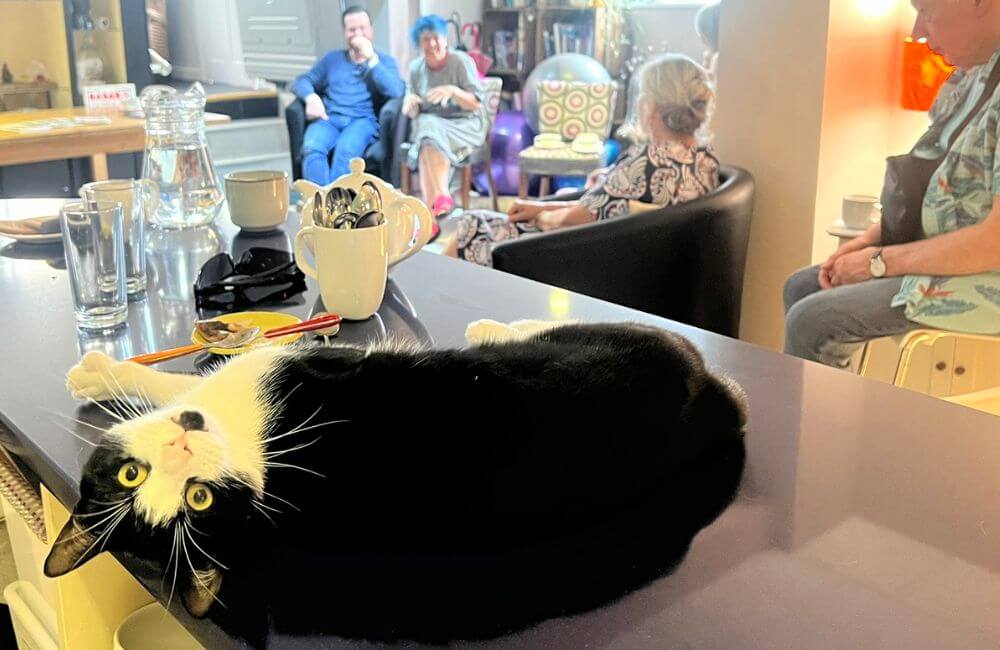
80 Years of The Atomic Bomb
The second poet, Irene Evens’ work is saltier.
We sat in silence as she shared a work, written 30 years ago (and commissioned by the CND) to commemorate the then 50-year-old bombing of Hiroshima.
Last week marked the 80th anniversary of that day. The day the world changed. She begged us to remember the fragility of life as we know it. Conflict is now never ‘far away’.
A Great Worrier
Irene described her father as a ‘great worrier,’ (which she acknowledges she perhaps inherited), and I wondered if that is an essential part of a poet’s craft.
Even the term, ‘great worrier,’ (which ‘great’ normally means huge), could mean ‘great’ as magnificent.
Maybe we should venerate our worriers?
For her 80th birthday, Irene gifted herself a poem. Sharp, zingy and age-deprecating, she’s a reminder to never conflate physical frailty with weakness.
Words on Language and Travel
Fittingly for our language school, both poets wrote about language learning, and about travel.
Jennie’s recent work is the story of her Italian grandmother, who fell in love with a Scotsman and left her homeland to follow him post-war to our damp, austere land, where she strove to become the perfect ‘Scot’s wife’ — stirring barley into soup wearing a silken scarf.
We discussed how you belong between places, once leaving your homeland indelibly alters you.
(Our minds holding the image of a vibrant Italian trying to assimilate, making home cooking as his mum had, rather than being celebrated for the recipes and culture she brought.)
Irene wrote about the richness of Spain, and the way Covid took the world from her, confining her in her Scottish home.
Her poem, ‘The Ticket,’ is an ode to the simplest memento of travel, the proof that she once knew freedom.
(How quickly it became an impossibility).
The AI Bomb
The formal poetry reading moved into a more relaxed conversation about process and inspiration, and then (just like the book reading on the previous night), someone launched the topic of AI.
(Do we always need to ask our artists this? It feels like asking a religious leader for permission to knock down a church.)
The group seems to agree that the written word, and handmade crafts in general, are needed as an antidote to this new thing that might masquerade as art, but doesn’t smell like it, or feel like it, as soon as you hold it.
I remember my daughter losing a favourite toy baby. I rushed to buy a replacement, but she never accepted the new doll, (which to my eyes looked the same).
It turns out, it didn’t just need to look identical; it needed to smell familiar and feel right when she held it.
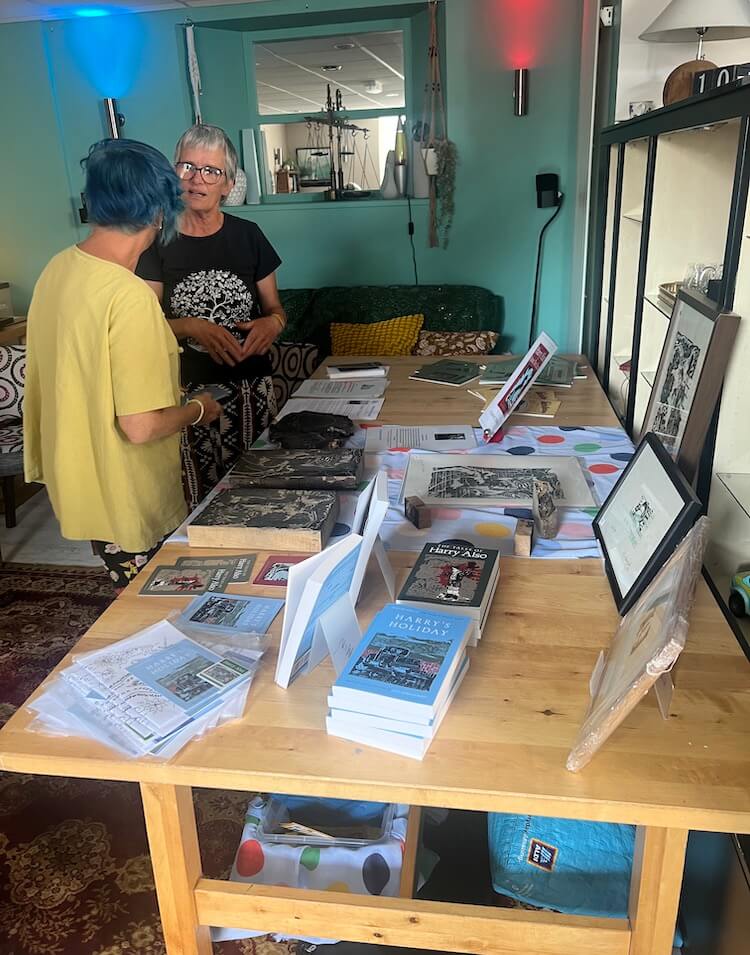
About Technology
Irene confessed to being blissfully out of touch with technology.
She gets a neighbour to format her poems into the required ‘Times New Roman, 12-point font’ before she posts them off to magazines (the old-fashioned way!)
John, who wrote his first books every November (because that’s when his online international writing group ran their daily word count challenge), has found his voice because of the internet.
He finds social media more capricious. He talked about the difficulties of self-promotion needed to be visible to make an income from his writing.
How can you promote something as subtle as poetry on social media?
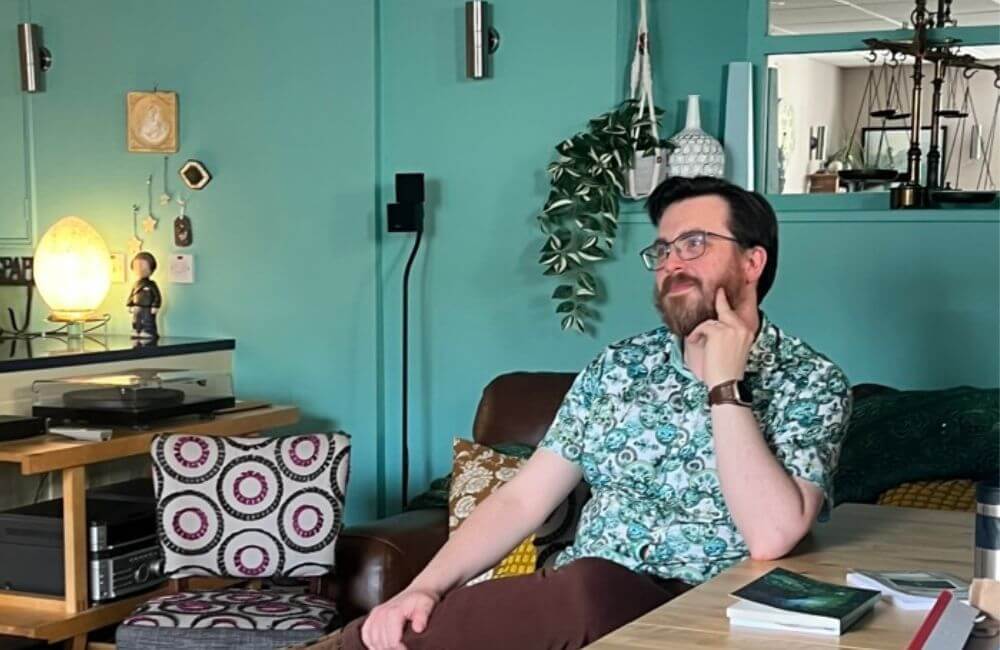
About Reading
The comment that impacted audience and poets alike, was John saying that 20 per cent of the population don’t hear an inner voice in their head when they read.
He assured us that there was now scientific research supporting this.
(At this point, poets and audience were looking at each other carefully, but no one seemed less incredulous than the next person).
(With hindsight, I hope that there wasn’t one of our little group feeling suddenly exposed. Conversation had quickly taken a slightly othering form, out of innocent sheer curiosity.)
This discovery had been made because of social media and the Internet. (The difference had first come up in an online chat, which had allowed many people to express whether they did or didn’t hear a reading voice.)
John assured us that both groups enjoy reading equally, although interestingly, he understood that the silent readers were less interested in audiobooks (because the connection between the narrator and words was less familiar.
The Advantage of Local Festivals
Our literary event ended with a friendly debate over who should do the dishes, and an offer from an audience member to drive Irene home.
I’m aware that the Edinburgh Fringe and Arts Festival is on (as I write, I have a family taking an English language holiday with me, and they are enjoying a second day at the Edinburgh festival today). ‘One day is not enough!’ It’s the biggest arts festival in the world.
Bigger isn’t always better for a cultural event. Sure, there’s more choice and more to see and hear, and it attracts international talent. But with all that choice comes the feeling that you can’t see everything, the need to rush on to the next thing.
Conversely, it can be even harder to invest time in something that needs effort or stillness, like poetry.
It’s easy for something quiet to turn invisible in this environment.
I’m so very glad I made time to listen (and could offer our space to poets to be heard).
Please support the Cireff Art Festival in 2026, we will!
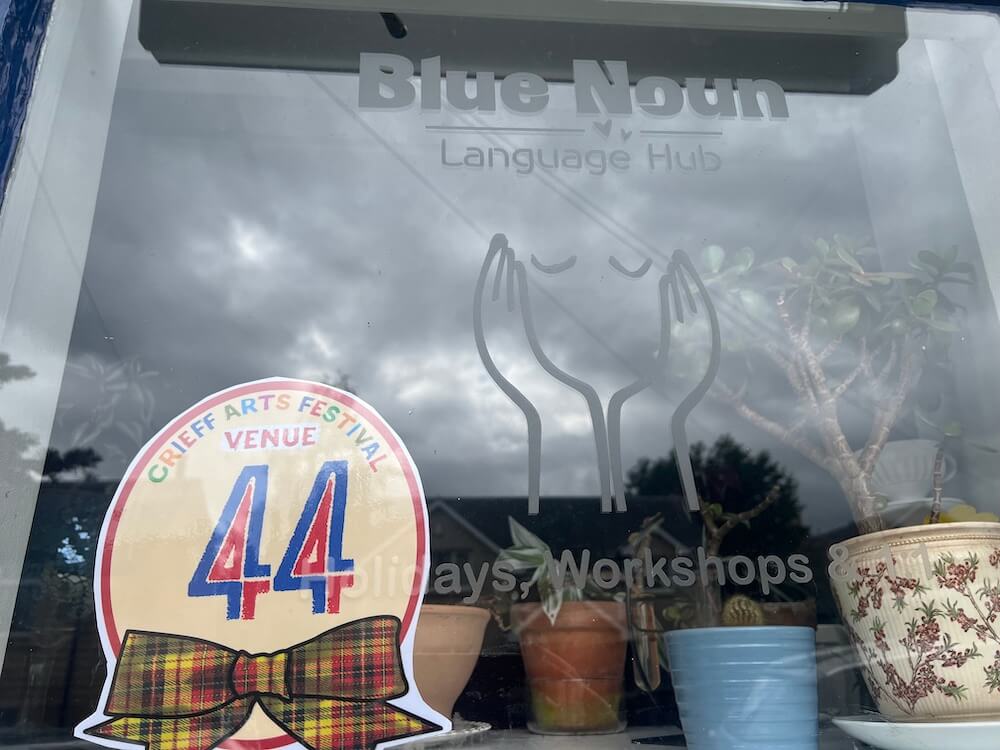
Further Information
A Guide to Our Hub
Take a Tour of the Blue Noun Language Hub Space
Discover the Blue Noun learning space in Scotland — a permanent, experience-designed place for real-world English, conversation, and community-based learning.

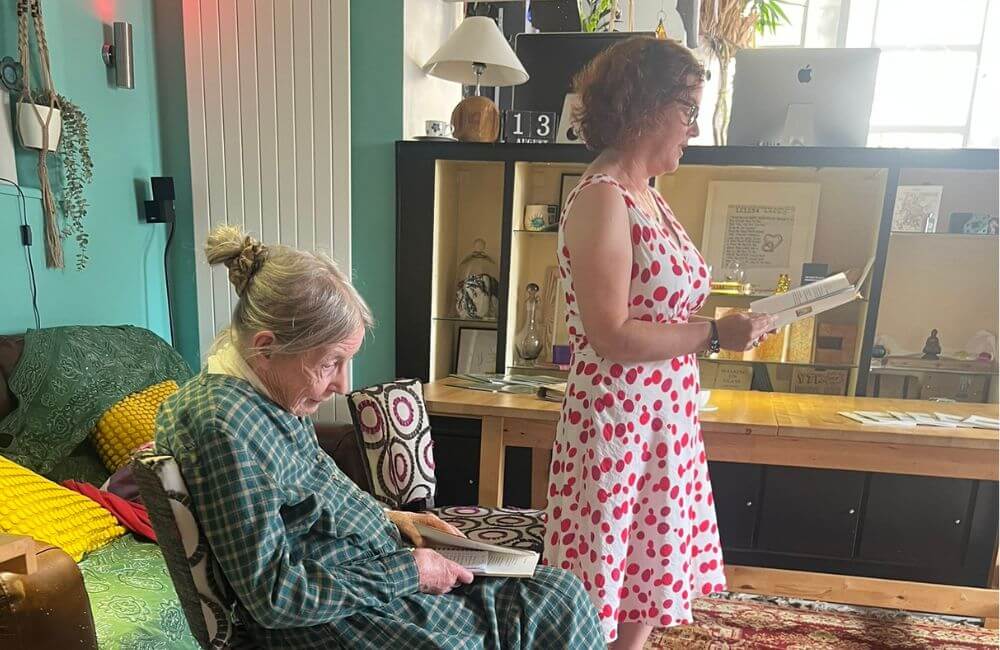
You got that blog post up fast! Thought I’d share some sources for anendophasia (no inner monologue), and aphantasia (no inner pictures).
They’re both fascinating from a writer’s perspective because I find it so hard to imagine what it’s like to be inside their mind.
anendophasia: https://www.newsweek.com/no-inner-voice-problem-memory-learning-anendophasia-1901472
aphantasia:
https://psyche.co/ideas/i-have-no-minds-eye-let-me-try-to-describe-it-for-you
Thank you John, that’s a great addition – and useful to add in the technical term.
Hi, Thank you for the invitation to join in the wonderful eveny at The Blue Noun and for the links you have set out.
To me it is always the questions that folk ask especially the younger members as they have a different insight and are so interesting.
Hi Celia, how lovely to hear from you. It was a fabulous event. We look forward to hosting again next year.